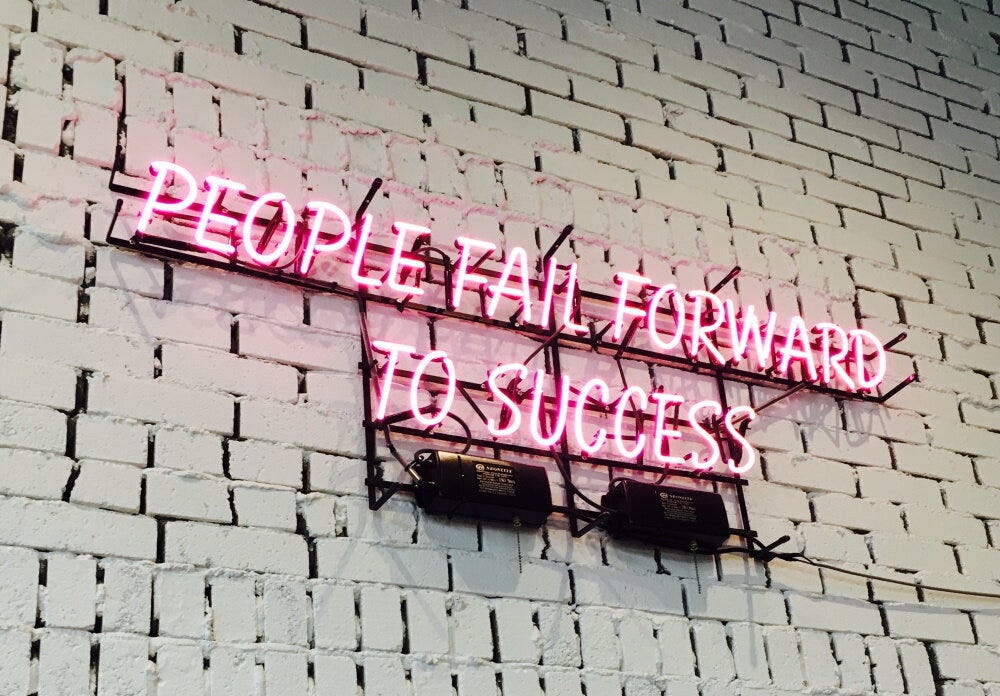Before your mind goes in the gutter or you roll your eyes at this clickbaity title, hear me out.
Failure is a word that stokes fear, resistance, and anxiety in the hearts of many. Failure might be the real F-bomb, as it often creates negative feelings, upset stomachs, and even rage.
While we may tell everyone else that failure is OK, we probably don’t all feel that way deep down when it happens to us. But your relationship with failure determines how willing you are to succeed.
Are you able to stare fear down and put it in its place? Are you ready to accept that failure is 100% part of life? To accept failure and use it as your rocket fuel to launch your next success?
In a culture that celebrates perfectionism and showcases their “highlight reels” on social media, it’s tough to make peace with failure. However, doing so is a necessary step in our personal growth and development.
Everything is Not Awesome
We often attempt to sweep failure under the rug and shy away from addressing the F-word head-on. We’ll soften the language with “challenges” or “growing pains,” rather than calling a failure what it appears to be.
After all, who wants to admit failure? Who wants to work with someone or give a project to someone who failed in spectacular fashion?
What’s odd is that we love a story of overcoming adversity, and even repeated failure.
Twelve different publishers passed on J.K. Rowling’s initial pitch for the Harry Potter series.
Michael Jordan famously noted that he missed more than 9,000 shots and lost 300 games in his star-studded NBA career.
Vincent Van Gogh sold one singular painting during his lifetime.
Steve Jobs, Bill Gates, Michael Dell, Mark Zuckerberg -- all college dropouts who went on to lead multi-million and billion-dollar tech companies known around the world.
Our heroes fail all the time -- and yet we don’t allow this of ourselves.
We seem to think everything we do should be flawless, and we are reluctant to admit failure.
But here’s the reality: Zero failure is impossible. Everyone fails. Get used to saying it, accepting it and looking for the response rather than dwelling on what happened.
My own consulting company was born out of a response to a personal failure. A few years ago, I was laid off from a technology startup after just three months. Turns out, they never should have hired me, as the board was not patient enough to allow for change to happen and I was not the magician I believed I was.
I started offering my services as a fractional CMO immediately afterwards based on the learning that companies don’t always need a full-time VP of marketing. Renting one is a better solution sometimes, especially since people don’t always know what they need. While failure may not have been avoidable in this situation, it could have been easier to handle if I’d been more clear on expected results and actual deliverables before signing up for the project.
Expecting and Accepting Failure
If you are managing a group, it is important to make failure acceptable in your culture. Don’t shame the group or single out those who failed. I’m going to bet that they didn’t mean to fail when they started.
Here are some questions to help the group admit and accept failure (with compassion) next time this happens:
What was the intention of the task/project?
Did we stay true to that intention or did we get taken off course?
What were we measuring when we were working on this project/task?
What did we learn that we can apply to the next project/task etc.?
These questions help us remain constructive and show your team that you are on their side in helping to solve the solution.
How do you relate to the F-word?
Do you admit failure when it happens?
How do you feel about yourself when you say the phrase, “I failed at X”
Do you know this excites some people? They feel they are one step closer to learning what is about to work. Others take this as a sign of weakness or stupidity. Can you take it in stride?
Self-coaching question: Try saying the F-word aloud multiple times: “I failed at X” or “I really failed today when I…”
What does it feel like to hear yourself say that you failed?
Where do you feel the failure and what emotions come up?
By owning and acknowledging the failure, you open up the possibility to learn from and accept your imperfect self. It can take some time, so be patient as you process the failure and trust that in time, the wisdom will emerge.
Talk about the failure to yourself and others. Say the F-word again and again. Are you able to get more comfortable with it as you hear yourself saying it?
See if you can find a smile somewhere and know that your failure, while not at all what you want, is somehow getting you closer to what you’re after. You can’t change the past, so the quicker you move on, the better it will be.
Yet Another “Likely to Fail” Batter Up
Any veteran salesperson knows that you’ll hear “no” more than “yes” when presenting a product or service. According to Marketing Donut, just 2% of sales are made during the first meeting, and 80% of customers will say no four times before they say yes.
And yet, we run from failure. We seem to think that if we are clever enough, we can tiptoe around the edge of failure and deliver only 100% successes, you know, like no one ever in history.
Consider Ty Cobb, the greatest statistical batter ever. Cobb is credited with the highest career batting average in the history of professional baseball at .367. He had over 11,000 plate appearances and failed over 7,000 times. He succeeded just over 4,000 times.
A well-designed marketing and sales program can get Ty Cobb-like numbers, but the point is that you fail more than you succeed, so why are we so shy about it?
How did you fail today?
Recently, I read that I should be asking my sons, “How did you fail today?” to encourage more learning and exploration at school.
Both kids were floored when I popped this question at the dinner table and neither one of them felt comfortable answering. After repeated tries, they are starting to explore how they failed and reframing what failure looks like. But it made me think: If a 7-year-old is uncomfortable admitting failure, what does that say about the rest of us?
There is a lot of talk about the virtue of failure. I’ve even heard of startups throwing failure parties where they literally celebrate the recent failures as a way to encourage teams to take chances, test new ideas, and set ambitious goals (Tom and David Kelley talk about this in their book, Creative Confidence).
But to really learn from failure, it takes more than celebration and acknowledgment. And many of us aren’t lucky enough to work in firms that throw a party when we fail.
So how do we learn from failure, and what does that look like for the solopreneur or small to mid-size business?
The retrospective: 3 key questions for reflecting on failures
Next time you and your team experience a failure (big or small), do a retrospective on the failed initiative or program so you can learn how to do this better next time. This type of discussion also creates an open environment with your team to talk about the failure.
If you haven’t done a retrospective before, here’s a simple format with three important questions to ask yourselves:
What went well? | 10 Minutes
Spend a few minutes talking about what went well and document these on a whiteboard or notepad. Encourage everyone on the team to add at least something even if they are repeating what others have said before.
What was surprising or didn’t go well? | 10 Minutes
Try to get as detailed as possible on the critical point of failure. What is the team’s belief about what didn’t go well and why?
What do we change for next time? | 20 Minutes
The answers may not come right away, but brainstorming early might open some doors. You may also need to more fully understand the successes and failures with your customers, vendors, or other stakeholders.
Record action items and set next meetings | 10-15 Minutes
Once you have your three lists, it’s time to assign to-dos and set a course for deeper understanding in a future meeting. It takes time to accept and interpret the results. For more on agile retrospectives, here’s a great primer with some suggestions.
Failure is Hard (Not trying is Harder!)
Documenting the failure doesn’t change the fact that most of the time, failure is still hard to swallow. It also happens all the time, again and again.
To begin letting go of and learning from your failures, it can help to journal about your experience. Journaling is a proven way to learn and helps the venting process as well.
Ask yourself questions such as:
What was the failure?
How did the recent failure happen? Or what caused the failure?
Was there a key mistake that lead us to the larger failure?
Can I clarify the cause and effect?
What can I learn or take away from this experience?
Is there any collateral damage I need to clean up with my customers, business partners, team or board?
What’s the best way to communicate this failure and what is my plan to do so?
Finally, do something nice for yourself. After dwelling on the negative aspects of what happened, you deserve a break.
You will likely feel some sense of relief in reviewing lessons learned and understanding the root cause, however, the sting of a bad decision can take some time to wear off. Try to indulge in some stress relief and turn the page. For me, this often involves meditation, a long walk in the woods or playing my drums.
Once you’ve given yourself time to recover, you’ll likely find that you have enough distance from the situation to reframe your perspective on what happened. You don’t need to rationalize your failure, but you should find ways to accept and learn from it, rather than letting your bruised ego and frustration rule the day.
The Transformative Power of Failure
There is a powerful transformation that happens after coming to grips with failure and stepping back into the ring. You realize you can't be completely defeated and you can rise above the failure.
Each time you fail and recover, it becomes easier to remember and harness that power, and use it to overcome the next bump in the road.
I’d love hear what you think about failure and how you relate to it in your own life.
Please comment below…











Wonderful piece with so many helpful bits, Dave! I am keeping this one on hand.